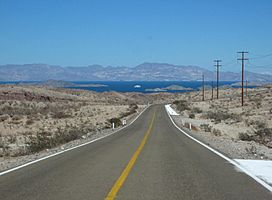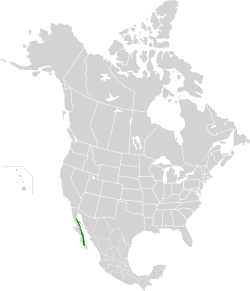Gulf of California xeric scrub facts for kids
Quick facts for kids Gulf of California xeric scrub |
|
|---|---|

Approaching Gulf of California at Bahía de los Ángeles
|
|

Location of the Gulf of California xeric scrub
|
|
| Ecology | |
| Realm | Nearctic |
| Biome | Deserts and xeric shrublands |
| Borders | Baja California Desert, San Lucan xeric scrub, and Sonoran Desert |
| Geography | |
| Area | 22,573 km2 (8,715 sq mi) |
| Country | Mexico |
| States | Baja California and Baja California Sur |
| Conservation | |
| Conservation status | Vulnerable |
| Protected | 11,386 km² (50%) |
The Gulf of California xeric scrub (which means "dry scrubland" in Spanish: Spanish: Matorral xerófilo del Golfo de California) is a special kind of dry, shrubby land found in Mexico. It's located on the Baja California Peninsula, right next to the beautiful Gulf of California. This area is called an ecoregion, which means it's a large natural space with its own unique plants and animals.
Contents
Where is the Gulf of California Xeric Scrub?
This interesting ecoregion covers about 23,600 square kilometers (that's about 9,100 square miles). It stretches along the eastern side of the Baja California Peninsula, right next to the Gulf of California.
Mountains and Borders
Tall mountains called the Peninsular Ranges run down the middle of the peninsula. These mountains, like the Sierra de San Francisco and Sierra de la Giganta, separate the Gulf of California xeric scrub from another desert called the Baja California Desert on the Pacific Ocean side.
The xeric scrub area goes from the gulf shore all the way up to the top of these mountains. It also includes some islands in the gulf, such as Isla Ángel de la Guarda, Isla del Carmen, and Isla San José. To the north, this ecoregion meets the Sonoran Desert. At the very southern tip of the peninsula, it changes into the San Lucan xeric scrub.
Plants of the Desert
Most of this ecoregion is covered in dry shrubland. The main plants you'll see are creosote (Larrea tridentata) and desert burr sage (Ambrosia dumosa). Other plants include Jatropha cinerea, palo fierro (Olneya tesota), Acacia brandegeana, Cercidium floridum, and Pithecellobium undulatum.
Palm Oases
In some stream valleys, you can find green spots called palm oases. These places have water all year round, allowing special plants to grow. The native palm Washingtonia robusta and the introduced date palm (Phoenix dactylifera) are common trees here. You might also see reeds like Typha domingensis and Phragmites communis.
Unique Plant Life
The Gulf of California xeric scrub is home to 238 different kinds of plants. About 20 to 25% of these plants are endemic, which means they are found nowhere else in the world! There are even 20 types of plant genera that are unique to this ecoregion.
Animals of the Desert
This ecoregion is home to several large mammals. These include the desert bighorn sheep (Ovis canadensis), mule deer (Odocoileus hemionus), and the puma (Puma concolor).
Bird and Reptile Species
Some birds that are considered threatened in this area are the masked bobwhite quail (Colinus virginianus ridewayi) and the peninsular yellowthroat (Geothlypis beldingii). There are also nine types of reptiles that are found only in this ecoregion.
Protecting the Desert
A study in 2017 showed that about 11,386 square kilometers (or 50%) of this ecoregion is protected. This means these areas are set aside to keep the plants and animals safe.
Important Protected Areas
Large parts of the northern and central xeric scrub are protected by the Valle de los Cirios Flora and Fauna Protection Area and the El Vizcaíno Biosphere Reserve. The islands in the gulf are protected by the Gulf of California Islands Flora and Fauna Protection Area and Bahía de Loreto National Park. Also, two of the special palm oases, Oasis Sierra de La Giganta and Oasis de la Sierra El Pilar, are recognized as Ramsar sites, which means they are wetlands of international importance.
See also
 In Spanish: Matorral xerófilo del Golfo de California para niños
In Spanish: Matorral xerófilo del Golfo de California para niños
- List of ecoregions in Mexico
 | May Edward Chinn |
 | Rebecca Cole |
 | Alexa Canady |
 | Dorothy Lavinia Brown |

